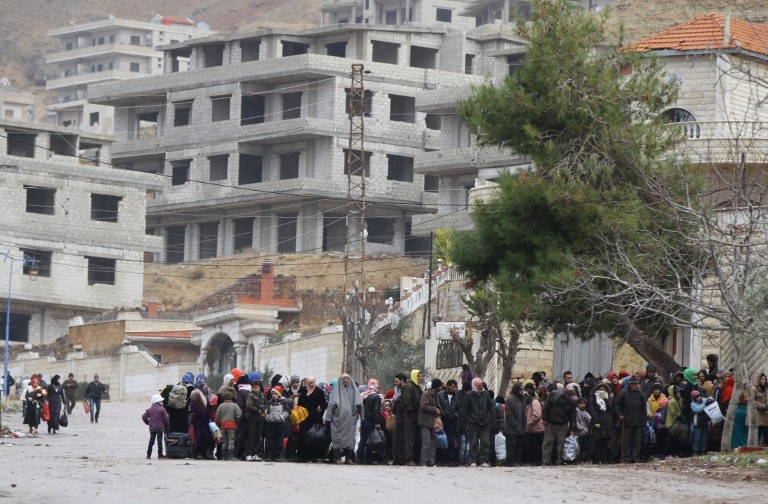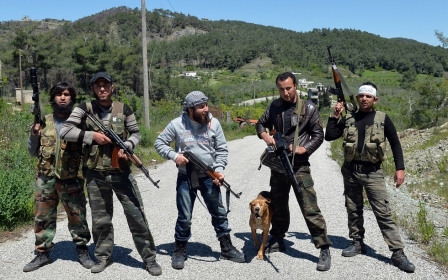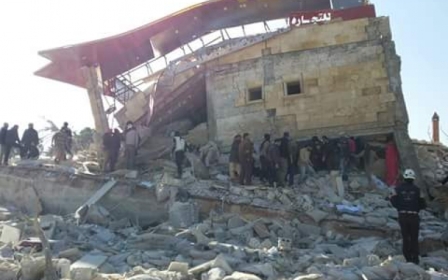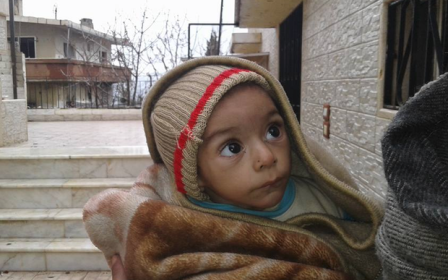Syria agrees humanitarian aid for 7 besieged areas: UN

The United Nations said late on Tuesday that Syria has agreed to allow access for humanitarian aid to seven besieged areas of the war-torn country.
"So far I understand that the Government of Syria has approved access to seven besieged areas, including Deir ez-Zor, Foah and Kafraya in Idleb, and Madaya, Zabadani, Kafr Batna and Madamiyet Elsham in rural Damascus," said Vanessa Huguenin, spokeswoman for the United Nations Office for the Coordination of Humanitarian Affairs (OCHA).
"Humanitarian agencies and partners are preparing convoys for these areas, to depart as soon as possible in the coming days," she added.
Damascus gave the green light to the aid convoys after the UN special envoy for Syria Staffan de Mistura visited the capital on Tuesday.
De Mistura earlier in the day had announced that an aid convoy would be sent on Wednesday to several towns under siege by the government or the rebels.
"It is clear it is the duty of the government of Syria to want to reach every Syrian person wherever they are and allow the UN to bring humanitarian aid, particularly now after so long time," he told journalists after a meeting with Syrian Foreign Minister Walid Muallem.
Speaking before the UN announcement, Carsten Hansen, the Jordan director for the Norwegian Relief Council, said the ceasefire plan was the best chance groups like his had to end the suffering of the Syrian people.
"I have a lot of scepticism, as do a lot of people, because this agreement leaves a lot of room for war. One of my first reactions [last week] was why do we have to wait a week - why not stop tonight?"
"But from a humanitarian side, the agreement contains hope. If it is possible to gain access to areas that have been besieged it is possible now to start getting aid into these limited amount of locations, and gain a continuous supply that is life-saving for the people in those areas.
"If this fails, in a worst case scenario the consequences will be so much worse. Trust and confidence is already slim, and if this agreement is violated it will push people to a worse situation."
Hansen said he expected aid groups would find new Madayas.
"We have seen what it means for a population to be besieged for several months," he said. "We have seen this in Madaya when access was granted.
"Those areas that have been under heavy bombardment for a long time you will find terrible situations. It is difficult to imagine what is waiting."
There are differing figures for the number of Syrians besieged across the country.
The UN Office for Coordination of Humanitarian Affairs (OCHA), in its most recent figures, put the number at almost 490,000 in 19 locations, while Siege Watch, a monitoring network, says there are almost 1.1 million in 46 active sieges. Doctors Without Borders (MSF) puts the figure as high as two million besieged.
Most sieges are enforced by the Syrian government and are located around Damascus, though rebels and the Islamic State (IS) group are also besieging towns, including Foah and Kafraya and Deir Ez-Zor, which the UN says the government has identified as areas to which humanitarians should have access to bring aid.
Using Siege Watch's latest figures, access to the areas approved by the Syrian government would bring aid to at least 295,500 people.
Hansen said that saving lives was guaranteed if aid groups gained sustained and safe access.
"If you have access and it is safe and it continues, it is a technical exercise. This is what organisations like ours are meant to do - it is just a matter of resources. It is not the biggest problem," he said. "The problem is to get safe access and then continued access. One convoy of trucks and then that's it will not work. It has to continue.
"The war in Syria will stop one day, so this is not our last chance, but it is a crucial moment. We are at a crossroads. Let us hope this is the first step that leads to something bigger. The Syrian people deserve that."
In other Syria-related news:
- Syria's UN envoy on Tuesday accused the medical aid charity MSF of being a front for French intelligence in Syria and dismissed allegations that Russian air strikes had destroyed one of its hospitals. "The so-called hospital was installed without any prior consultation with the Syrian government by the so-called French network called MSF which is a branch of the French intelligence operating in Syria," said Ambassador Bashar Jaafari.
- The Pentagon said it would respond "as necessary" if there were violations of a cessation of hostilities agreement in Syria, warning it was a "test" for Russia. Pentagon press secretary Peter Cook would not specify the nature of the response, but said a failure to abide by the agreement reached in Munich would be factored into US military decision-making.
- Turkey called for a ground operation on Tuesday with its international allies to end the war in Syria. "We want a ground operation with our international allies," a senior Turkish official told reporters in Istanbul, adding such an operation would require the involvement of the United States and Gulf states. "There is not going to be a unilateral military operation from Turkey to Syria," the official emphasised, but added: "Without a ground operation it is impossible to stop the fighting in Syria."
- Saudi Arabia has resumed participation in air strikes by a US-led coalition against the Islamic State group in Syria, according to the Pentagon. Saudi Arabia, which had shifted its focus to Yemen after initially taking part in the US-led campaign, also has recently deployed warplanes to the Incirlik Air Base in Turkey for an intensified campaign against IS, a senior Saudi defense official said over the weekend.
Additional reporting by MEE's Graeme Baker.
New MEE newsletter: Jerusalem Dispatch
Sign up to get the latest insights and analysis on Israel-Palestine, alongside Turkey Unpacked and other MEE newsletters
Middle East Eye delivers independent and unrivalled coverage and analysis of the Middle East, North Africa and beyond. To learn more about republishing this content and the associated fees, please fill out this form. More about MEE can be found here.




